

(3) VID+ The Coming of Independence (1763-83) Economic tensions Leading to AWI. Embroiled in wars with other European countries, Britain was too busy to pay much attention to the American colonies for the first part of the eighteenth century.
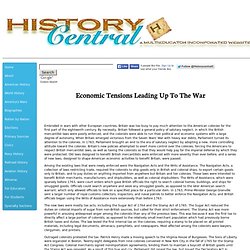
By necessity, Britain followed a general policy of salutary neglect, in which the British mercantilist laws were poorly enforced, and the colonists were able to run their political and economic systems with a large degree of autonomy. When Britain emerged victorious from the Seven Years' War with heavy war debts, Parliament turned its attention to the colonies. VID: Causes of AWI.
(1) VID: Tea, Taxes, and The American Revolution. Colonial Responses to Parliamentary Acts. VID: Taxes & Smuggling. (2) Events 1763-69. British troops land in Boston. British Toops Arrive in Boston. Townshend Acts. Charles Townshend spearheaded the Townshend Acts, but died before their detrimental effects became apparent.
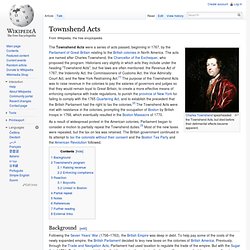
The Townshend Acts were a series of acts passed, beginning in 1767, by the Parliament of Great Britain relating to the British colonies in North America. The acts are named after Charles Townshend, the Chancellor of the Exchequer, who proposed the program. As a result of widespread protest in the American colonies, Parliament began to consider a motion to partially repeal the Townshend duties.[3] Most of the new taxes were repealed, but the tax on tea was retained. Economic Retaliation. Townshend Repealed. The colonial boycott of British goods hurt British merchants in London and beyond.
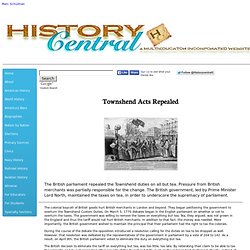
They began petitioning the government to overturn the Townshend Custom Duties. On March 5, 1770 debates began in the English parliament on whether or not to overturn the taxes. The government was willing to remove the taxes on everything but tea. Tea, they argued, was not grown in the England and thus the tariff would not hurt British merchants. In addition to that fact, the money was needed. Declaratory Act. The American Colonies Act 1766 (6 Geo 3 c 12), commonly known as the Declaratory Act, was an Act of the Parliament of Great Britain, which accompanied the repeal of the Stamp Act 1765.
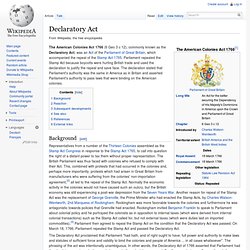
Parliament repealed the Stamp Act because boycotts were hurting British trade and used the declaration to justify the repeal and save face. The declaration stated that Parliament's authority was the same in America as in Britain and asserted Parliament's authority to pass laws that were binding on the American colonies. Background[edit] VID: Declaratory Act (1766) to the Coercive Acts (1774) Repeal of Stamp Act. Notice of Stamp Act of 1765 in Newspaper The Stamp Act 1765 (short title Duties in American Colonies Act 1765; 5 George III, c. 12) imposed a direct tax by the British Parliament specifically on the colonies of British America, and it required that many printed materials in the colonies be produced on stamped paper produced in London, carrying an embossed revenue stamp.[1][2] These printed materials were legal documents, magazines, newspapers and many other types of paper used throughout the colonies.
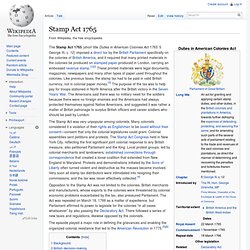
Colonial response to the repeal of the Stamp Act. The Repeal, Or The Funeral Of Miss Ame-Stamp. VID: Grenville's Policies, 1763-65. Last revised: March, 2014 Acceptance of Terms Please read this Terms of Service Agreement ("Terms of Service", "Terms of Use") carefully.
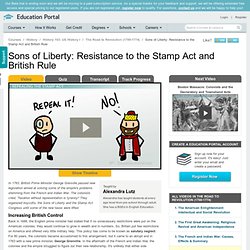
These terms apply to Education Portal and its related websites owned and operated by Remilon, LLC ("Education Portal,", "Site", "Sites", "our", "us"). Education Portal provides the Services, which are defined below, to you subject to the following Terms of Service, which may be updated by us from time to time without notice to you. BY ACCESSING, BROWSING OR USING THE SITE AND THE SERVICES PROVIDED THROUGH OR IN CONNECTION WITH EDUCATION PORTAL, YOU SIGNIFY AND ACKNOWLEDGE THAT YOU HAVE READ THE TERMS OF SERVICE AND AGREE THAT THE TERMS OF SERVICE CONSTITUTES A BINDING LEGAL AGREEMENT BETWEEN YOU AND EDUCATION PORTAL, AND THAT YOU AGREE TO BE BOUND BY AND COMPLY WITH THE TERMS OF SERVICE. Privacy Policy. Freeman Vid 5 - Outraged Colonials: The Stamp Act Crisis. Imports & exports. Boston Non-Importation Agreement. A society of patriotic ladies, at Edenton in North Carolina. Printed for R. Sayer & J. Bennett, 1775 March 25.
Library of Congress. Nonimportation Agreements. Beginning with the unpopular Grenville reforms of the mid-1760s and continuing for a decade, the nonimportation agreement or boycott was the chief American means to gain the attention of faraway British policymakers.
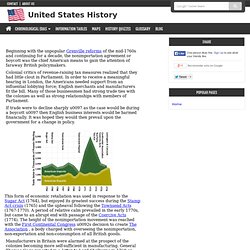
Colonial critics of revenue-raising tax measures realized that they had little clout in Parliament. In order to receive a meaningful hearing in London, the Americans needed support from an influential lobbying force; English merchants and manufacturers fit the bill. Many of those businessmen had strong trade ties with the colonies as well as strong relationships with members of Parliament. If trade were to decline sharply u0097 as the case would be during a boycott u0097 then English business interests would be harmed financially. It was hoped they would then prevail upon the government for a change in policy. Stamp Act. Stamp Act (summary) VID: Stamp Act. Sons of Liberty (1) Green Dragon Tavern, Union Street, 1898.
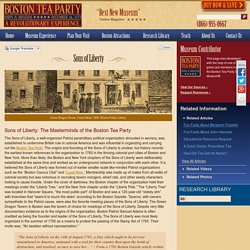
Boston Public Library. Sons of Liberty (2) Sons of Liberty (3) In the popular imagination, the Sons of Liberty was a formal underground organization with recognized members and leaders.
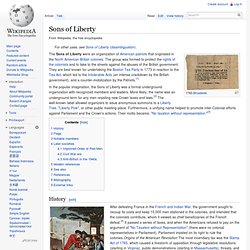
More likely, the name was an underground term for any men resisting new Crown taxes and laws.[2] The well-known label allowed organizers to issue anonymous summons to a Liberty Tree, "Liberty Pole", or other public meeting-place. Furthermore, a unifying name helped to promote inter-Colonial efforts against Parliament and the Crown's actions. Their motto became, "No taxation without representation. "[3] History[edit] The organization spread month by month, after independent starts in several different colonies. Patriots or Terrorists? By Todd Alan Kreamer SONS OF LIBERTY, or Sons of something altogether different?
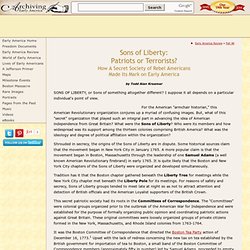
I suppose it all depends on a particular individual's point of view. For the American "armchair historian," this American Revolutionary organization conjures up a myriad of confusing images. But, what of this "secret" organization that played such an integral part in advancing the idea of American independence from Great Britain?
Loyal Nine. The Alternative of Williamsburg, 1775, Emmet Collection of Manuscripts. New York Public Library. Join, or Die. Join, or Die by Benjamin Franklin was recycled to encourage the former colonies to unite against British rule "Join, or Die" is a well-known political cartoon, created by Benjamin Franklin and first published in his Pennsylvania Gazette on May 9, 1754.[1] The original publication by the Gazette is the earliest known pictorial representation of colonial union produced by a British colonist in America.[2] It is a woodcut showing a snake cut into eighths, with each segment labeled with the initials of one of the thirteen American colonies or region. New England was represented as one segment, rather than the four colonies it was at that time. In addition, Delaware (then a part of Pennsylvania) and Georgia were omitted completely.
Thus, it has 8 segments of snake rather than the traditional 13 colonies.[3] The two northernmost British American colonies at the time, Nova Scotia and Newfoundland, were not represented, nor were any British Caribbean possessions. Humour: Stamp Act Riot To-Do List. Stamp Act Congress (1) Stamp Act Congress (2) Virginia Stamp Act Resolutions. Quartering Act. Colonial response to Quartering Act. PUPPETS: Quartering Act: British/Colonist perspective. Vid: Quartering Act 1765. Colonial responses. Currency Act. The colonies suffered a constant shortage of currency with which to conduct trade. There were no gold or silver mines and currency could only be obtained through trade as regulated by Great Britain.
Sugar Act. VID: The Sugar Act 1764. VID: APUSH Review: Why 1763 is so important. Royal Proclamation. Effects of the Royal Proclamation. VID: Royal Proclamation of 1763. Pontiacs Rebellion. VID: Attitudes towards Britain in 1763.